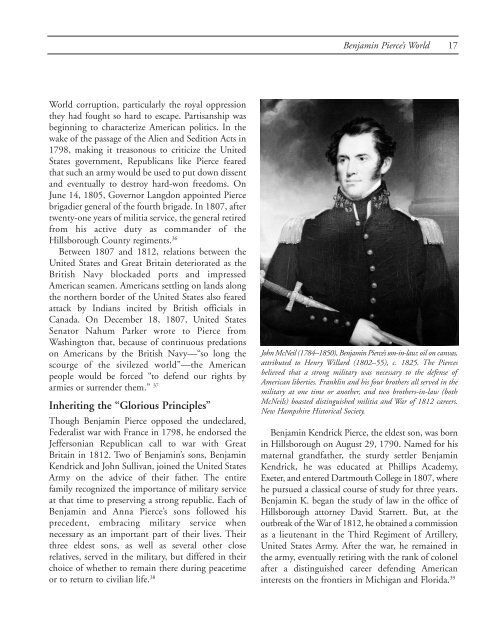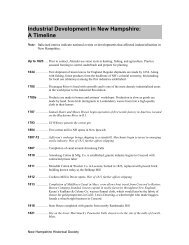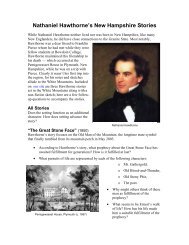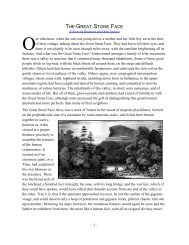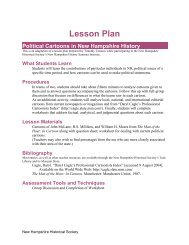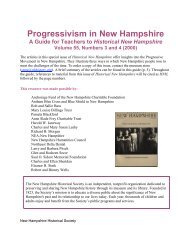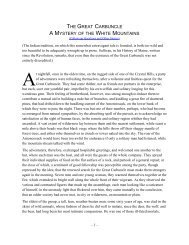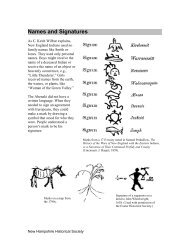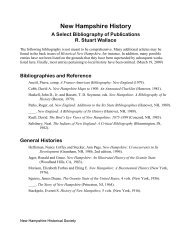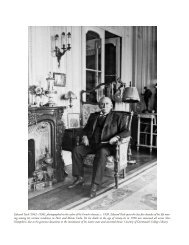Governor Benjamin Pierce - New Hampshire Historical Society
Governor Benjamin Pierce - New Hampshire Historical Society
Governor Benjamin Pierce - New Hampshire Historical Society
You also want an ePaper? Increase the reach of your titles
YUMPU automatically turns print PDFs into web optimized ePapers that Google loves.
<strong>Benjamin</strong> <strong>Pierce</strong>’s World 17<br />
World corruption, particularly the royal oppression<br />
they had fought so hard to escape. Partisanship was<br />
beginning to characterize American politics. In the<br />
wake of the passage of the Alien and Sedition Acts in<br />
1798, making it treasonous to criticize the United<br />
States government, Republicans like <strong>Pierce</strong> feared<br />
that such an army would be used to put down dissent<br />
and eventually to destroy hard-won freedoms. On<br />
June 14, 1805, <strong>Governor</strong> Langdon appointed <strong>Pierce</strong><br />
brigadier general of the fourth brigade. In 1807, after<br />
twenty-one years of militia service, the general retired<br />
from his active duty as commander of the<br />
Hillsborough County regiments. 36<br />
Between 1807 and 1812, relations between the<br />
United States and Great Britain deteriorated as the<br />
British Navy blockaded ports and impressed<br />
American seamen. Americans settling on lands along<br />
the northern border of the United States also feared<br />
attack by Indians incited by British officials in<br />
Canada. On December 18, 1807, United States<br />
Senator Nahum Parker wrote to <strong>Pierce</strong> from<br />
Washington that, because of continuous predations<br />
on Americans by the British Navy—“so long the<br />
scourge of the sivilezed world”—the American<br />
people would be forced “to defend our rights by<br />
armies or surrender them.” 37<br />
Inheriting the “Glorious Principles”<br />
Though <strong>Benjamin</strong> <strong>Pierce</strong> opposed the undeclared,<br />
Federalist war with France in 1798, he endorsed the<br />
Jeffersonian Republican call to war with Great<br />
Britain in 1812. Two of <strong>Benjamin</strong>’s sons, <strong>Benjamin</strong><br />
Kendrick and John Sullivan, joined the United States<br />
Army on the advice of their father. The entire<br />
family recognized the importance of military service<br />
at that time to preserving a strong republic. Each of<br />
<strong>Benjamin</strong> and Anna <strong>Pierce</strong>’s sons followed his<br />
precedent, embracing military service when<br />
necessary as an important part of their lives. Their<br />
three eldest sons, as well as several other close<br />
relatives, served in the military, but differed in their<br />
choice of whether to remain there during peacetime<br />
or to return to civilian life. 38<br />
John McNeil (1784–1850), <strong>Benjamin</strong> <strong>Pierce</strong>’s son-in-law; oil on canvas,<br />
attributed to Henry Willard (1802–55), c. 1825. The <strong>Pierce</strong>s<br />
believed that a strong military was necessary to the defense of<br />
American liberties. Franklin and his four brothers all served in the<br />
military at one time or another, and two brothers-in-law (both<br />
McNeils) boasted distinguished militia and War of 1812 careers.<br />
<strong>New</strong> <strong>Hampshire</strong> <strong>Historical</strong> <strong>Society</strong>.<br />
<strong>Benjamin</strong> Kendrick <strong>Pierce</strong>, the eldest son, was born<br />
in Hillsborough on August 29, 1790. Named for his<br />
maternal grandfather, the sturdy settler <strong>Benjamin</strong><br />
Kendrick, he was educated at Phillips Academy,<br />
Exeter, and entered Dartmouth College in 1807, where<br />
he pursued a classical course of study for three years.<br />
<strong>Benjamin</strong> K. began the study of law in the office of<br />
Hillsborough attorney David Starrett. But, at the<br />
outbreak of the War of 1812, he obtained a commission<br />
as a lieutenant in the Third Regiment of Artillery,<br />
United States Army. After the war, he remained in<br />
the army, eventually retiring with the rank of colonel<br />
after a distinguished career defending American<br />
interests on the frontiers in Michigan and Florida. 39


